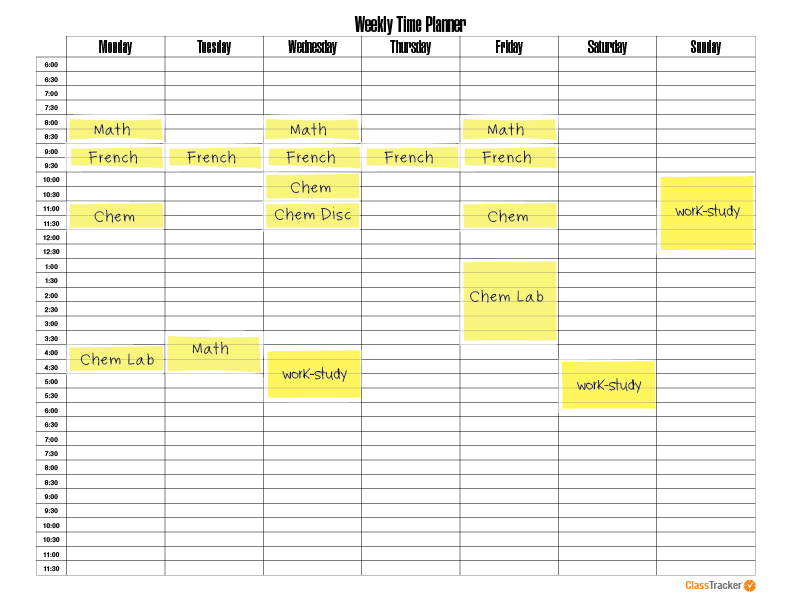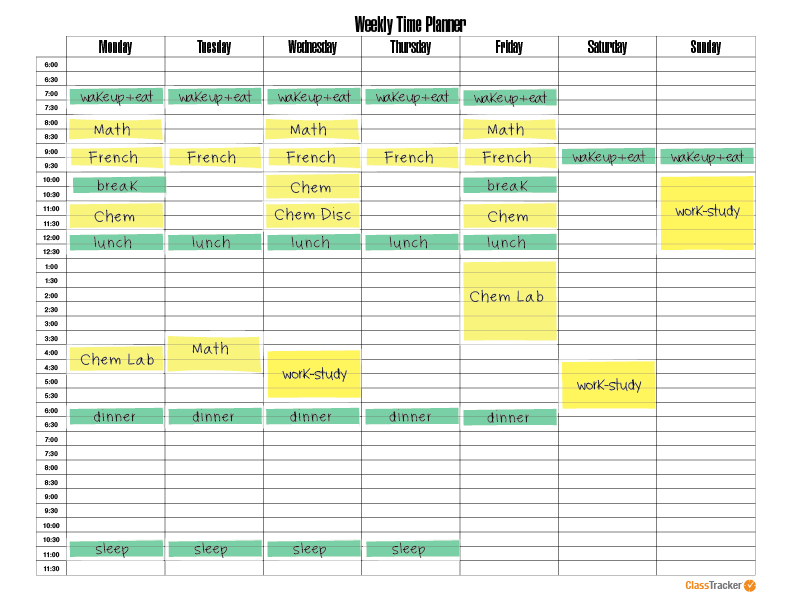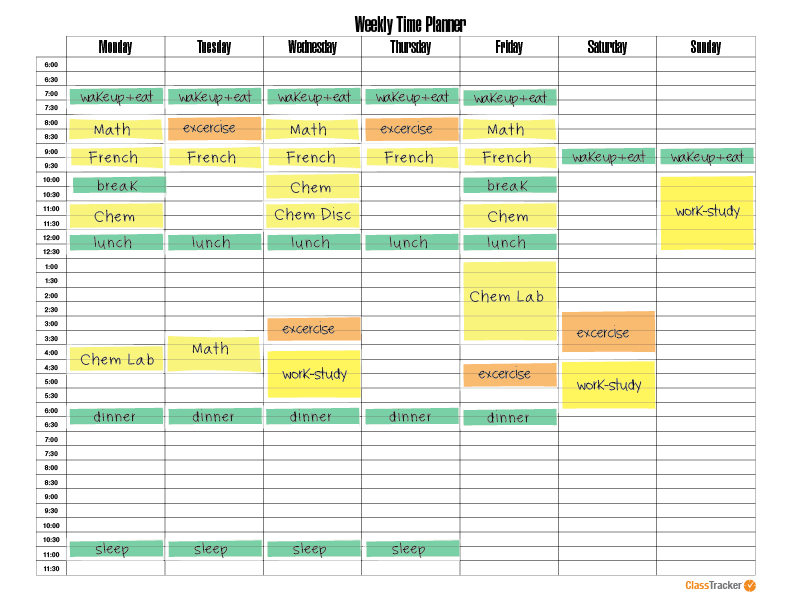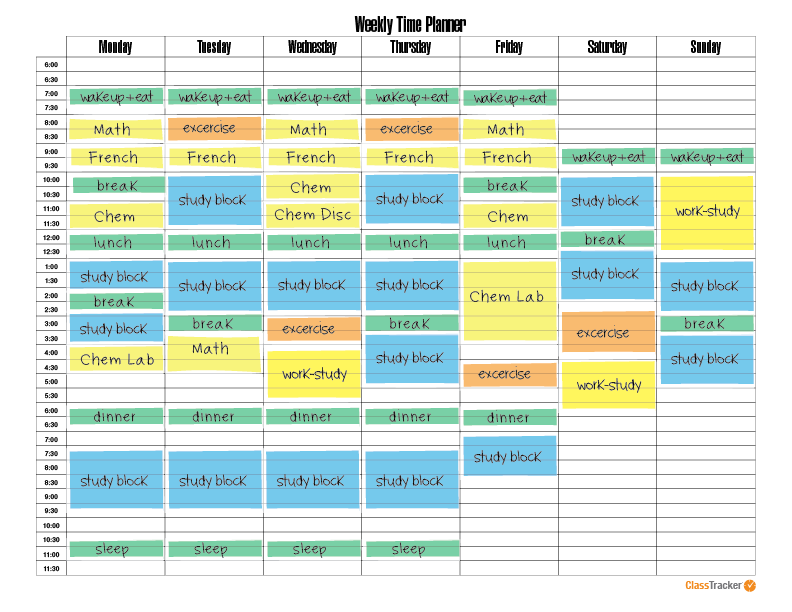How To Create A Weekly Plan That Will Make You Successful In College
One of the biggest challenges in transitioning from high school to college is learning how to manage unscheduled time. In high school, your time is scheduled for you: you go to classes all day, do your extra-curriculars, work at your job, etc. and then head home. The only “unscheduled time” is after school and weekends. When you get to college, however, all that changes. Because you take fewer classes and your classes meet less frequently than in high school, a typical college student’s school week rarely includes two days that look exactly alike. Some days you might have back to back classes all day and into the night, while other days you might find yourself with only one,or even no classes. And, of course, if you have a job, you’ll have to squeeze those work hours in between everything else you have going on.
For many students, these open (and sometimes large) blocks of time can prove to be challenging because they don’t know how to manage them. Time is often wasted, leaving them scrambling to get their assignments done at the last minute, or cramming for a test. With a little bit of planning and discipline you don’t have to fall into this trap. Follow this three step process and you’ll be well equipped to take on the challenges of your new college schedule.
Part 1: Map out your week so you can see your unscheduled/free time
In order to get a clear picture of when you are busy (i.e. in class, eating, exercising, attending meetings, at sports practice, etc.) and when you are not, take a few minutes to map out your week using either the ClassTracker weekly time planner or an electronic calendar.
Step 1: Block out your classes and work study/job
Step 2: Block out when you will wake up, get ready for the day, eat and plan to go to sleep.

Step 3: Block out when you want to exercise (or something to take care of you!)

Be sure to keep your time planner someplace where you can easily access it. If you are using an electronic planner, make sure your calendar is up to date. If you are using a paper planner, post your time planner somewhere you will see it or slip it into your planner.
Once you have your filled out schedule in front of you, you are ready to move on to Part Two.
Part 2: Block out time that you will work on school assignments
Once you know when you have pockets of time, the next step is to add “study blocks” into your schedule. These are the times that you know will not otherwise be scheduled and when you will be fully dedicated to completing assignments and studying for exams. The most effective students spread out their time across a day. They will pack up their bag in the morning with everything they need for class and will frequently stay on campus for the entire day. A great time to get work done is in between classes, or after your last class of the day. These are times when you might want to relax or hang out, but those couple of hours will make a real difference in your overall preparedness.

One way to evaluate how much time you will need outside of class, is to consider that each credit hour or unit you take will require an additional 2-3 hours of work outside of class, assigned or otherwise. So if you are taking 12 units, then expect you’ll need between 24-36 hours a week dedicated to assignments and class preparation. Study blocks can range in time (ideally you’ll give yourself 1-2 hours, but 45 minutes is plenty of time to tackle a problem or read an article or two), but keep in mind a few best practices:
- Be sure to take a stretch break every 25 minutes, for at least 5 minutes. This will keep your brain fresh longer than if you just power through. Get some water, walk around, stretch...do something to shift your focus away from what you are working on. You will be surprised to find how this little break can often offer you a fresh perspective on a problem.
- Pick an effective place for your study sessions. Find a place in which you’ll be free from distractions. Some people like to pick a not-so-comfortable place to keep them focused on their work (think basement of library - no wifi, rigid chairs and no one around).
- Have a clear idea of what you need to accomplish (see Part 3). Figuring out what you need to do before you sit down is critical for getting your work done. This is why having a great college planner is so important.
Part 3: Know what you need to get done this week and the next (two or three)
At the beginning of the semester, take time to go through your syllabus and write down, in your planner, all due dates for tests, quizzes, papers, and projects. Do this as soon as you get your syllabi. Being able to see how all the assignments from your different classes overlap and intersect in one place is hugely important in how you manage your time. It will become clear very quickly which weeks are super heavy and and which are light. During those lighter weeks, it’s in your best interest to get ahead and prepare for those heavier weeks (i.e. start studying earlier, write a paper before it’s due, complete readings ahead of time).
On a weekly basis (ideally at the end of the week or on Sunday), add in all additional assignments (i.e. readings, problem sets, etc.) for the following two weeks as well as any social or extracurricular activities that have come up, so you know exactly what you need to get done and by when. Some people prefer to write in assignments when they want to complete them and others when they are due. Do whatever makes sense for you, but be sure to keep track of what needs to get done and by when.
Check out our post: Master your planner in 5 easy steps
With your planner filled out, you will know exactly what you need to get done during each of your study breaks, ensuring that you make the best use of your time and really excel in college.
Lesley Martin has been working in education over the last 20 years. She currently works with students privately as an Academic Success Coach and is the CEO of ClassTracker, a company she founded that creates customized academic planners for middle and high schools and students. Lesley has published two books: Where’s My Stuff: The Ultimate Teen Organizing Guide and Make the Grade: Everything you need to Study Better, Stress Less, and Succeed in School.
